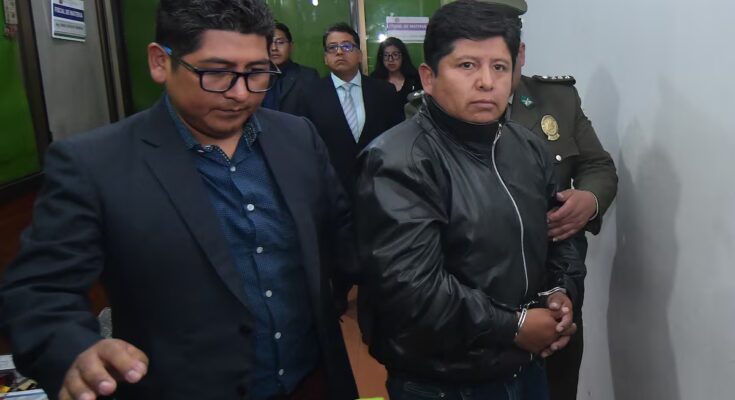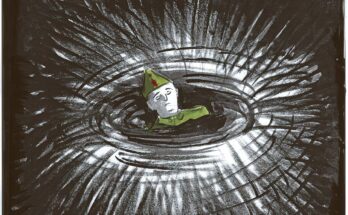The Central of Bolivian Workers (COB) closed a historical phase of more than 70 years as the engine of social struggles in its country with the arrest, on Tuesday, of its highest authority until 2025, Juan Carlos Huarachi, under investigation for illicit enrichment, improper use of influence and extortion. The now former executive secretary of the organization has been surrounded by controversy since his appointment in 2018: it was normal to see him dressed in a miner’s helmet near the presidents in office, first Evo Morales, then Luis Arce and even Jeanine Áñez, with whom he negotiated an extension of his mandate. The bases of the COB, the flag of the fight against the military dictatorship, are aware of the degradation that their image has suffered, proposing to the new board of directors to recover “union autonomy”.
Huarachi will serve six months of preventive detention in La Paz’s San Pedro prison after a judge ruled there was “sufficient probability” that he abused his political influence to receive bribes. The key witness is a former official of the Ministry of Environment and Water, who claims to have handed over, between 2022 and 2023, almost $6,000 to the plant’s top manager. She is represented by Abel Loma, an attorney with a long career defending government corruption charges.
The jurist assures that there are inconsistencies in the banking financial movement of Huarachi, who receives a salary of over 4 thousand dollars as an assistant driller for the state mining company Huanuni. “Former Environment Minister Juan Santos Cruz (imprisoned since 2023) sent money to Huarachi to gain COB support and stay in office. COB nominated and suggested names to the president.” The corruption plot is still being uncovered and affects other headquarters executives, as well as former public officials.
The impact on the largest trade union organization in Bolivia, founded with the slogan of taking the demands of its members to the streets, is still being measured. The COB was founded on April 17, 1952, a few days after the armed revolution that established universal suffrage in Bolivia, agrarian reform and the nationalization of mines, then the country’s main source of income.
The historical fact is essential to understand the organization, explains Lorgio Orellana, author of numerous books on the history of the workers’ movement and research professor at the Institute of Social and Economic Studies of the University Mayor of San Simón (UMSS), Lorgio Orellana: “It emerged as an organ of power, protected by workers’ militias who acted as a true state power, against the official army defeated during the insurrection. After the revolution, the form of the union became universal and was assimilated by farmers, students and teachers; by joining the COB, they recognized his moral authority and role as a revolutionary leader.
This is what the new leader Mario Argüello, elected last October, is referring to when he talks about “bringing the plant back to its essence”. The close relationship between the Executive and the COB, however, is not exclusive to the years (2006-2025) of the Movement towards Socialism (MAS). The founder and executive secretary of the institution for 25 years, Juan Lechín, was Minister of Mines and then vice-president of the government established after the 1952 uprising. The military regimes that subsequently arrived in the country (1965-1982) had as their main enemies the miners – until today the strongest arm of the COB – and Lechín, its highest representative, which cost him prison and exile with his leadership.
The return to democracy in the 1980s brought with it neoliberal governments (1985-2005) and privatization policies, which the COB addressed by organizing popular uprisings. “The decentralization of production processes has reduced the number of concentrated and unionized workers, weakening the COB’s mobilization capacity. Despite this, it has maintained a certain moral authority and played a leading role in insurrectional processes such as the 2002 Water War and the 2003 Gas War,” explains Orellana. This process of political change ended with the rise to power of Evo Morales and his party, the MAS.
Being a decisive factor in the change, social organizations, including the COB, claimed their share of power. An exercise of power and the development of clientelistic ties which, says Orellana, is not recent: “The corruption, subordination and passivisation of popular organizations has characterized populist governments; it has been a form of building legitimacy”. Thus, for example, Pedro Montes, who was executive secretary of the union from 2006 to 2012, was then a senator of the MAS from 2015 to 2020. But the most controversial case would be that of Huarachi.
First, the Labor leader ingratiated himself with Morales by publicly supporting a third re-election, which is illegal under the Constitution. The decision led to the social crisis of 2019, and when Morales was cornered, Huarachi joined the voices calling for his resignation. Subsequently, in Áñez’s interim government, he negotiated the recognition of the Ministry of Labor to extend his mandate, which ended in 2020. Finally, with the inauguration of Arce in the same year, he took his side when the fratricidal war against Morales broke out.
The fall of the COB coincides with the turn to the right that Bolivia took a few weeks ago with the new presidency of Rodrigo Paz. Many of the top positions are taken over by the same authorities from the neoliberal phase, the last period in which the central office had a subversive character. An opportunity, according to the workers themselves, favorable to the start of a new cycle of mobilizations that recover the old ability to unite factories, transporters, miners and farmers.


